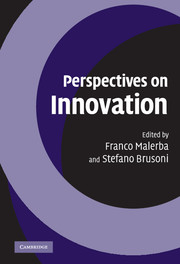Book contents
- Frontmatter
- Contents
- List of figures
- List of tables
- List of contributors
- Prefatory note
- Introduction
- Part 1 Innovation and economic growth
- Part 2 The microdynamics of the innovation process
- Part 3 Innovation and industrial dynamics
- Part 4 Innovation and institutions
- Part 5 Innovation, firms' organization, and business strategies
- Part 6 Innovation and entrepreneurship
- Part 7 Innovation and evolution of the university system
- Part 8 Innovations and public policy
- 15 Innovation systems, innovation policy and restless capitalism
- 16 Intellectual property rights and competition policy
- 17 The policy-shaper's anxiety at the innovation kick: how far do innovation theories really help in the world of policy?
- Index
17 - The policy-shaper's anxiety at the innovation kick: how far do innovation theories really help in the world of policy?
Published online by Cambridge University Press: 06 January 2010
- Frontmatter
- Contents
- List of figures
- List of tables
- List of contributors
- Prefatory note
- Introduction
- Part 1 Innovation and economic growth
- Part 2 The microdynamics of the innovation process
- Part 3 Innovation and industrial dynamics
- Part 4 Innovation and institutions
- Part 5 Innovation, firms' organization, and business strategies
- Part 6 Innovation and entrepreneurship
- Part 7 Innovation and evolution of the university system
- Part 8 Innovations and public policy
- 15 Innovation systems, innovation policy and restless capitalism
- 16 Intellectual property rights and competition policy
- 17 The policy-shaper's anxiety at the innovation kick: how far do innovation theories really help in the world of policy?
- Index
Summary
Introduction
If he was alive today Schumpeter would need to include a new actor in his analysis of the dynamics of knowledge-based capitalism: the ‘policy-shaper’, that is, a civil servant working in the Ministry of Research or Industry in charge of supporting the policy process by preparing decisions. These decisions might concern, for example, budgets to allocate to research and how to distribute them between research domains (or between different types of organizations), the design of incentive structures such as fiscal measures (to convince private enterprises to invest in knowledge creation) or the regulations that define the professional status and career structure of researchers.
Unlike the macro-economist working in the Treasury or the micro-economist working in the Competition Commission, the ‘policy-shaper’ involved in research and innovation policy is a strange animal. His or her education background is diverse: he or she is either a scientist from natural or social sciences, a management specialist, a lawyer or an engineer. His or her professional experience varies as well: he or she may come from the world of research that he or she has abandoned some time ago, have a business experience or a career in the public service as a generalist.
The knowledge base he or she is drawing upon to understand the world in which he or she operates in is thus quite heterogeneous and eclectic because of the above-mentioned lack of professional codification but also because the theories and related evidence he or she needs to mobilize are fragmented, sometimes contradictory and often in flux.
- Type
- Chapter
- Information
- Perspectives on Innovation , pp. 464 - 489Publisher: Cambridge University PressPrint publication year: 2007
- 6
- Cited by



